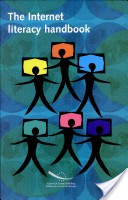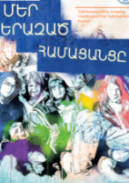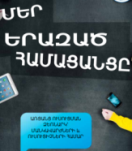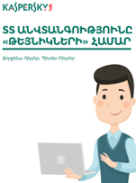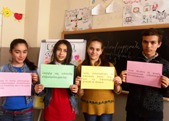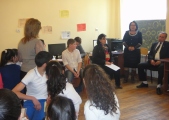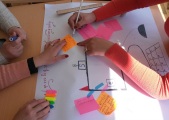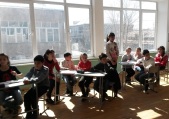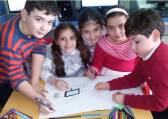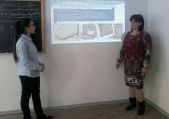Pan-European “Better Internet” Forum Engages Youth Participants
A member of the International Youth Council for Safer Internet, Vardges Atoyan, a student at Berd High School in Tavush Region, and Anna Abelyan, principal of School No. 107, which was recognized as the Best “Safer Internet Armenia 2024” School, participated in the pan-European “Better Internet for Children” conference held in Brussels. The forum’s main message was: “Where is the harm? How can we protect children and young people from inappropriate content and cyberbullying?”
Young people’s experiences and perspectives are crucial in addressing these challenges. During the forum, participants proposed strategies to promote the mental health and well-being of children and young people and to combat cyberbullying.
Key discussion topics included:
- Violent and aggressive content online: does it promote extremism?
- Cyberbullying and reluctance to report it: why speaking up is important
- Inappropriate content, including AI-generated content, and its impact on young people
- Inappropriate and harmful behavior of young people online
- Preventing self-harm
- The impact of hate speech on young people
- Excessive screen time and persuasive design: who is behind it?
- Cyberbullying and hate
- Inappropriate content online
- Disinformation
- Internet addiction
Safer Internet Day Is Celebrated on February 6
This year, Safer Internet Day will be observed on Tuesday, February 6, under the theme “Together for a Better Internet.” The Internet is a valuable space for children to learn new things and enjoy entertainment; however, it is important to use it responsibly and safely.
On our website, you can find age-appropriate tips and educational materials to help make the use of the Internet and other information technologies safer for children. Resources on safe Internet use, digital and information literacy, cyberbullying, and related topics are also available. You can download the Safer Internet Day logo and posters here.
Discover the Potential of Artificial Intelligence in Education: EUNAcademy Course
Center for Education Development and Innovation (NCEDI) Foundation are organizing a program that  enables teachers to participate in the online course “Exploring the Potential of Artificial Intelligence (AI) in Education,” offered on the European Schoolnet Academy platform.
enables teachers to participate in the online course “Exploring the Potential of Artificial Intelligence (AI) in Education,” offered on the European Schoolnet Academy platform.
The aim of the course is to provide teachers with a foundational understanding of the opportunities and challenges associated with artificial intelligence. Through its four modules, participants will explore AI-related resources, tools, and technologies that can be applied in teaching. Read more...
Invitation to Participate in the Pan-European STEM Discovery Campaign 2023
Join the pan-European science, technology, engineering, and mathematics campaign, STEM Discovery Campaign 2023. Within the framework of the Safer Internet Armenia program, the STEM Society and the NCEDI Foundation are organizing teacher training sessions to support effective participation in the campaign.
This year, all participants of the European Schoolnet Academy’s “Open Schooling,” “Nature-Based Solutions,” and other courses are eligible to take part in the STEM Discovery Campaign 2023 competition. Applications are open until April 30, 2023. Detailed terms and conditions are available on our website.
The STEM Discovery Campaign 2023 is a joint international initiative organized within the framework of the Scientix program, bringing together stakeholders worldwide to promote STEM education and careers.
This year’s campaign theme is “Identities in STEM.” Developing a STEM identity increases the likelihood that learners will build scientific literacy, and some may go on to pursue STEM career pathways. We invite everyone to participate in the STEM Discovery Campaign 2023 by organizing STEM-related activities and taking part in competitions.
For more information about the STEM Discovery Campaign 2023 and instructions on how to submit your project, please watch our video and read more...
Program for Teachers’ Participation in the European Schoolnet Academy Course
Within the framework of the Safer Internet Armenia program, STEM Society in cooperation with the National 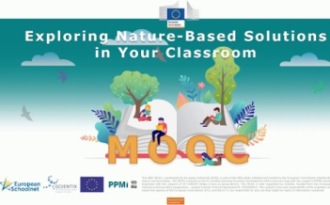 Center for Education Development and Innovation (NCEDI) Foundation of the RA Ministry of Education, Science, Culture and Sports is organizing a program that enables teachers to participate in an online course offered on the European Schoolnet Academy platform. We are becoming increasingly aware of environmental issues and their impact on our societies and everyday lives. Teachers strive to foster informed and active learners who will act and create in harmony with nature rather than apart from it. However, education on nature-based solutions (NBS) remains largely underexplored, as innovative programs and resources related to NBS are currently lacking in both formal and non-formal education settings for children and families. Read more..
Center for Education Development and Innovation (NCEDI) Foundation of the RA Ministry of Education, Science, Culture and Sports is organizing a program that enables teachers to participate in an online course offered on the European Schoolnet Academy platform. We are becoming increasingly aware of environmental issues and their impact on our societies and everyday lives. Teachers strive to foster informed and active learners who will act and create in harmony with nature rather than apart from it. However, education on nature-based solutions (NBS) remains largely underexplored, as innovative programs and resources related to NBS are currently lacking in both formal and non-formal education settings for children and families. Read more..
We celebrate Safer Internet Day on February 7
On Tuesday, 7 February 2023, we will celebrate the 20th edition of Safer Internet Day with actions taking place 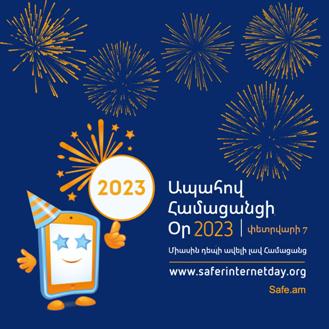 right across the globe. With a theme once again of "Together for a better internet", the day calls upon all stakeholders to join together to make the internet a safer and better place for all, and especially for children and young people. Read on to find out more about practical ways in which you can get involved in the celebrations. Whether you are a young person, a parent or carer, a teacher or an educator, a policy maker, or whether you represent an organisation or industry, everyone has a role to play in creating and maintaining a better online world.
right across the globe. With a theme once again of "Together for a better internet", the day calls upon all stakeholders to join together to make the internet a safer and better place for all, and especially for children and young people. Read on to find out more about practical ways in which you can get involved in the celebrations. Whether you are a young person, a parent or carer, a teacher or an educator, a policy maker, or whether you represent an organisation or industry, everyone has a role to play in creating and maintaining a better online world.
ALL DIGITAL WEEK Celebrated in Armenian Schools
ALL DIGITAL Week is held for the first time in Armenia, it is celebrated through workshops, training sessions, master classes with experienced experts in the field led by STEM Society in partnership 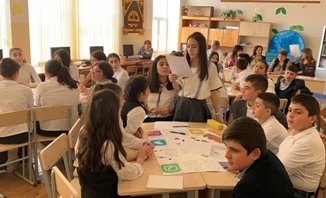 with Safer Internet Armenia Programme. STEM Society worked with schools which hosted events and activities in the Armenian capital city of Yerevan, as well as regional cities and towns: Alaverdi, Ashtarak, Charentsavan, Vanadzor, Fantan. The activities were aimed to empower young people with a wide set of digital skills, to develop their resilience and awareness in digital landscapes: understand and embrace tools to protect their safety and privacy online, know how to use, create and share online content in a responsible manner. Read more..., watch on our channel...
with Safer Internet Armenia Programme. STEM Society worked with schools which hosted events and activities in the Armenian capital city of Yerevan, as well as regional cities and towns: Alaverdi, Ashtarak, Charentsavan, Vanadzor, Fantan. The activities were aimed to empower young people with a wide set of digital skills, to develop their resilience and awareness in digital landscapes: understand and embrace tools to protect their safety and privacy online, know how to use, create and share online content in a responsible manner. Read more..., watch on our channel...
Youth Council for Digital Good Concluded its Work
Youth Council for Digital Good completed Public Consultations held in more than a dozen countries on making the Internet a safer, healthier and better environment. Have Your Say Posters outline Internet-related issues which need to be addressed to meet Sustainable Development Goals 2020. Problems that require immediate solution include cyber bullying, hate speech, privacy and personal data protection, misinformation and fake news. Participating countries: Armenia, Cyprus, Croatia, France, Germany, Greece, Iceland, Italy, Morocco, Senegal, Slovakia, USA. The survey was conducted by Insight (Luxemburg), Connect Safely (USA) and STEM Society (Armenia).
Eastern Partnership and Visegrad Countries Countering Disinformation
How to address the problem of disinformation and in particular the fake news? How does propaganda work and why do people become susceptible to it?  What potential risks may artificial intelligence-based techniques create in the disinformation warfare? Which competences should media literacy education develop to empower individual users and lead to greater social resilience against disorders of the information age? These and other issues have been presented by Narine Khachatryan (Media Education Center, Armenia) during the panel 'Fake News and General Public: How to Stand Up to Disinformation?' held at the 'Eastern Partnership and Visegrad Countries Countering Disinformation' forum on February 13, 2019 in Tbilisi. The forum was organized by Civil Development and Research Institute (CDRI) and Europe-Georgia Institute (EGI).
What potential risks may artificial intelligence-based techniques create in the disinformation warfare? Which competences should media literacy education develop to empower individual users and lead to greater social resilience against disorders of the information age? These and other issues have been presented by Narine Khachatryan (Media Education Center, Armenia) during the panel 'Fake News and General Public: How to Stand Up to Disinformation?' held at the 'Eastern Partnership and Visegrad Countries Countering Disinformation' forum on February 13, 2019 in Tbilisi. The forum was organized by Civil Development and Research Institute (CDRI) and Europe-Georgia Institute (EGI).
Safer Internet Week at Yerevan School after Hayrapetyan N 78
Yerevan based School N 78 after Hayrapet Hayrapetyan organizes Safer Internet Week: 9th  graders conduct lessons for younger pupils, during which they develop together strategies for the safe use of digital tools. Tests on the safe.am website allow them to quickly evaluate their knowledge of golden rules for the safe use of the Internet. Next year's Safer Internet Day (SID) celebrations will take place on Tuesday, 5 February 2019. The campaign's slogan, "Together for a better internet" is a call to action for everybody to join together and play their part in creating a better internet for everyone, especially youngsters.
graders conduct lessons for younger pupils, during which they develop together strategies for the safe use of digital tools. Tests on the safe.am website allow them to quickly evaluate their knowledge of golden rules for the safe use of the Internet. Next year's Safer Internet Day (SID) celebrations will take place on Tuesday, 5 February 2019. The campaign's slogan, "Together for a better internet" is a call to action for everybody to join together and play their part in creating a better internet for everyone, especially youngsters.
Create, Connect and Share Respect: A Better Internet Starts with You
On February 6, Safer Internet Day (SID), Safer Internet six-month programme kicked off in Armenia aimed at raising public  awareness of safe and effective use of the Internet and digital technologies and helping to create positive educational content online. Safer Internet program promotes education of children and adults using the Internet and online technologies. This year’s Safer Internet Day theme is “Create, Connect and Share Respect: A Better Internet Starts with You.”
Safer Internet 2018 is being implemented by STEM Center and Internet Society with support of Ucom and other organisations. More...
awareness of safe and effective use of the Internet and digital technologies and helping to create positive educational content online. Safer Internet program promotes education of children and adults using the Internet and online technologies. This year’s Safer Internet Day theme is “Create, Connect and Share Respect: A Better Internet Starts with You.”
Safer Internet 2018 is being implemented by STEM Center and Internet Society with support of Ucom and other organisations. More...
The Web We Want Handbook for Educators Published in Armenian
In a digital age being a Great Teacher means being a Good Digital Guide. The Web We Want Handbook for Educators is finally released in Armenian language! The Web We Want proposes plenty of ideas and lesson plans to encourage 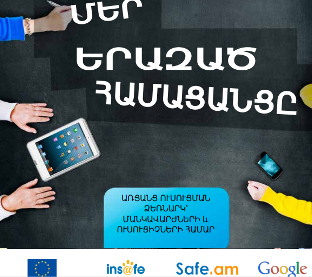 young people to develop creative and critical thinking skills essential for a fulfilled life in the world of tomorrow. Designed by teachers for teachers across Europe, the Book is a joint effort by INSAFE and The European Schoolnet. The Web We Want Armenian edition has been prepared in frames of Safer Internet Armenia Program.
young people to develop creative and critical thinking skills essential for a fulfilled life in the world of tomorrow. Designed by teachers for teachers across Europe, the Book is a joint effort by INSAFE and The European Schoolnet. The Web We Want Armenian edition has been prepared in frames of Safer Internet Armenia Program.
Be the Change: Unite for a Better Internet
23 teachers of Informatics have been awarded for outstanding efforts aimed at teaching young people Internet literacy and promoting online safety messages in their schools and communities. This  year Safer Internet Day has been celebrated in over 100 countries across all continents of the globe under the slogan ‘Be the Change: Unite for a Better Internet’. Armenian citizens have also joined efforts to make the Internet safer and better place for all. Media Education Center and Internet Society of Armenia with support of UCOM have launched the Safer Internet Armenia six-month program. Open lessons in Internet safety and meetings with parents have reached over 10 000 children and their parents in 200 secondary and high schools of Yerevan and Armenia’s regions. In frames of the STOP. THINK. CONNECT.™ Global online Safety Campaign ‘Chatting with Kids about Being Online’ book has been translated into Armenian language and published. European SchoolNet’s two Handbooks ‘The Web We Want: Young and Online - Activities by young people for young people’ and “The Web We Want: Teachers Online: Handbook for Educators” have been translated into Armenian. Watch video.
year Safer Internet Day has been celebrated in over 100 countries across all continents of the globe under the slogan ‘Be the Change: Unite for a Better Internet’. Armenian citizens have also joined efforts to make the Internet safer and better place for all. Media Education Center and Internet Society of Armenia with support of UCOM have launched the Safer Internet Armenia six-month program. Open lessons in Internet safety and meetings with parents have reached over 10 000 children and their parents in 200 secondary and high schools of Yerevan and Armenia’s regions. In frames of the STOP. THINK. CONNECT.™ Global online Safety Campaign ‘Chatting with Kids about Being Online’ book has been translated into Armenian language and published. European SchoolNet’s two Handbooks ‘The Web We Want: Young and Online - Activities by young people for young people’ and “The Web We Want: Teachers Online: Handbook for Educators” have been translated into Armenian. Watch video.
Raising a New Generation of Digital Citizens in Armenia
The launch of the Armenian version of the Web We Want Book for Young, published by European Schoonet (EUN), marked the ninth edition of Safer Internet Armenia. The programme, launched annually on Safer Internet Day (SID), currently unites public organisations, private organisations and educational institutions with the aim of raising awareness and educating about internet risks, privacy and security issues. In the framework of the Safer Internet Armenia programme (http://safe.am), each year schools in the capital city and regions of Armenia host open lessons and meetings with parents, during which issues related to safer use of the internet and digital technologies are discussed, and educational materials are disseminated. Participants receive relevant information on how best to use the internet for educational purposes, safely and effectively, while Armenian language resources are published and disseminated among different age groups. Read more on the Better Internet for Kids portal:
Armenian Edition of Web We Want Handbook for Young
Media Education Center in frames of Safer Internet Armenia Program launched the Armenian Edition of the The Web We Want Handbook for
 Young People of the European SchoolNet and INSAFE. For many young people in the early 21st century, their online personality, social interactions and activities are as important as their life in the physical world. Teachers, therefore, need to recognize this and help young people make the most of the opportunities online technologies and social media offer to develop key competences – and, crucially, become reflective and responsible citizens. Created by young people for young people, The Web We Want Handbook aims to explore rights and responsibilities and encourage reflection on their and peers' behaviour.
Young People of the European SchoolNet and INSAFE. For many young people in the early 21st century, their online personality, social interactions and activities are as important as their life in the physical world. Teachers, therefore, need to recognize this and help young people make the most of the opportunities online technologies and social media offer to develop key competences – and, crucially, become reflective and responsible citizens. Created by young people for young people, The Web We Want Handbook aims to explore rights and responsibilities and encourage reflection on their and peers' behaviour.
Chatting with Kids about Being Online in Armenian
STOP. THINK. CONNECT.™ is the Global Online Safety Awareness Campaign aimed to help all digital citizens stay safer and more secure online.
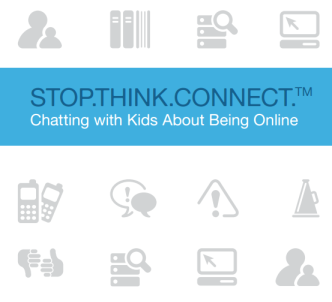 STOP. THINK. CONNECT. Chatting with Kids about Being Online Booklet is published in Armenian language in frames of Safer Internet Armenia program. The Booklet is part of STOP. THINK. CONNECT. global online safety public awareness campaign aimed at increasing the understanding of cyber threats and empowering the public to be safer and more secure online. The booklet provides practical tips from the US government and the technology community to help people guard against Internet fraud, secure computers, and protect privacy. STOP. THINK. CONNECT.™ Campaign messages in Armenian language can be found here.
STOP. THINK. CONNECT. Chatting with Kids about Being Online Booklet is published in Armenian language in frames of Safer Internet Armenia program. The Booklet is part of STOP. THINK. CONNECT. global online safety public awareness campaign aimed at increasing the understanding of cyber threats and empowering the public to be safer and more secure online. The booklet provides practical tips from the US government and the technology community to help people guard against Internet fraud, secure computers, and protect privacy. STOP. THINK. CONNECT.™ Campaign messages in Armenian language can be found here.
Global Online Safety Awareness Messages in Armenian
STOP. THINK. CONNECT.™ is the Global Online Safety Awareness Campaign aimed to help all digital citizens stay safer and more secure online. STOP: make sure security measures are in place. THINK: about the
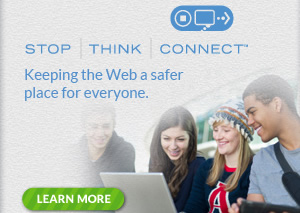 consequences of your online actions. CONNECT: and enjoy the Internet. is the global online safety awareness campaign to help all digital citizens stay safer and more secure online. The STOP. THINK. CONNECT.™ message was created by an unprecedented coalition of private companies, non-profits and government organizations with leadership provided by the National Cyber Security Alliance (NCSA) and the APWG. The campaign was launched in October of 2010 by the STOP. THINK. CONNECT. Messaging Convention in partnership with the U.S. government, including the White House. Campaign messages in Armenian language can be found here.
consequences of your online actions. CONNECT: and enjoy the Internet. is the global online safety awareness campaign to help all digital citizens stay safer and more secure online. The STOP. THINK. CONNECT.™ message was created by an unprecedented coalition of private companies, non-profits and government organizations with leadership provided by the National Cyber Security Alliance (NCSA) and the APWG. The campaign was launched in October of 2010 by the STOP. THINK. CONNECT. Messaging Convention in partnership with the U.S. government, including the White House. Campaign messages in Armenian language can be found here.
Media Literacy Class at Yerevan School after John Kirakosyan
October 17, 2016.
 Who create media messages and what techniques are used to attract my attention? How might different audiences understand the same message differently? What values are embedded in media messages? These and other questions have been discussed during the Media Literacy Class by Dr Rosemarie Conforti organised on October 17, 2016 at the Yerevan School after John Kirakosian by Media Education Center. Dr. Conforti is an Associate professor at the Media Studies Department of the Southern Connecticut State University, whose teaching is focused on media literacy education and media criticism. She has produced resources helping young women and girls to understand how the media portrais feminization, objectification, and sexualization of women.
Who create media messages and what techniques are used to attract my attention? How might different audiences understand the same message differently? What values are embedded in media messages? These and other questions have been discussed during the Media Literacy Class by Dr Rosemarie Conforti organised on October 17, 2016 at the Yerevan School after John Kirakosian by Media Education Center. Dr. Conforti is an Associate professor at the Media Studies Department of the Southern Connecticut State University, whose teaching is focused on media literacy education and media criticism. She has produced resources helping young women and girls to understand how the media portrais feminization, objectification, and sexualization of women.
Safer Internet Armenia Program Launched
Safer Internet Day, the Safer Internet Armenia program is launched aimed at promoting safe and effective usage of the Internet and other ICTs. The program has been carried out in Armenia since 2009 and
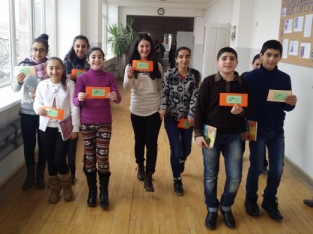 widely supported since 2012, when Orange Armenia joined the initiative in an effort to raise awareness about Internet risks, privacy and security issues through training programs for schools and information campaigns. Read reports about Safer Internet Armenia from Panorama, Noyan Tapan.
widely supported since 2012, when Orange Armenia joined the initiative in an effort to raise awareness about Internet risks, privacy and security issues through training programs for schools and information campaigns. Read reports about Safer Internet Armenia from Panorama, Noyan Tapan.
Winners of Best Open Lesson, Best Teacher-Parents Meeting Known
Winners of the Best Open Lesson and the Best Teacher-Parents Meeting have been announced:
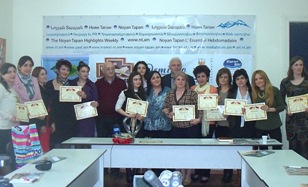 Marieta Davtyan – Yerevan Secondary School after Misak Metsarents,
Marieta Davtyan – Yerevan Secondary School after Misak Metsarents,Lusine Balayan - High School N 198 of Armenia's Ministry of Education and Science (Yerevan),
Naira Avetisyan - Yerevan Secondary School N 20 after John Kirakosian,
Meline Hakobyan - Yerevan Secondary School N 33 after Michael Nalbandyan,
Marine Harutyunyan - Yerevan Secondary School N 154,
Maria Lisitsina - Ohanian Educational Complex of Yerevan,
Ruzan Simonyan – Vagharshapat Secondary School N 3 after H. Hovhannisyan of the Armavir region,
Anush Ghevondyan - Vanadzor School N 18 of the Lori region,
Anush Torosyan - Vanadzor Secondary School N 19 after Raffee of the Lori region,
Hasmik Movsisyan - Artashat Secondary School N 22 after Hovhannes Tumanyan of the Ararat region.
Safer Internet Armenia: Open Lessons, Parent-Teacher Meetings
Open Lessons and Parent-Teacher Meetings have been held in Armenian schools. Safer Internet Armenia 2015 is implemented by Media Education Center, Internet Society of Armenia and Orange in cooperation with Yerevan Municipality and National Center of Educational technologies of Armenia's Ministry of Education and Science. Over 50 new Internet Literacy Lesson Plans, Parent-Teacher Meeting Plans have been uploaded to our web site. You can see pictures and videos from Open Lessons, as well as Power Point Presentations. Our Video Gallery has been completed with new works of teachers and pupils. Over 120 Armenian schools have joined the European eSafetylabel.eu Community during our workshops.
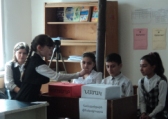 |
 |
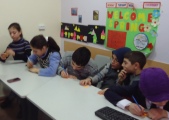 |
| Koghb School N 2 of Tavush region. Armine Abovyan | Yerevan School N 164 after Safaryan. Anzhelika Hakobyan | Orran benevolent non-governmental organisation. Marianna Tovmasyan |
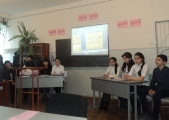 |
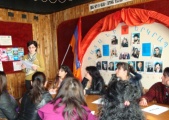 |
 |
| Ijevan school N 3. Mariam Aidinyan | Kapan School N 5. Anahit Aghagulyan | Stepanavan School N 2. Narine Gaginyan |

